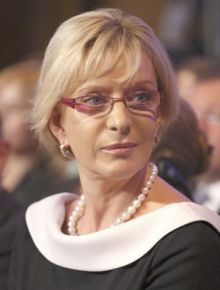What makes assemblies like the World Economic Forum in Davos valuable is that these ga-therings of the world’s most important, responsible and affluent people can extract the historical from that which is routine. What is on the world’s mind? What are its worries and hopes? What are the crucial issues now? How can Ukraine mo-dernize its economy and worldview so as to finally move forward?
The Day has already published some materials on the World Economic Forum 2011. But, speaking to Natalia IZOSIMOVA, chairman of the board of the Foundation for Effective Governance and regular at Davos, we tried to take a deeper, more historical perspective. What we saw was quite interesting.
Undoubtedly, the World Economic Forum in Davos is an important event that needs to be properly assessed. The Day has already published a number of opi-nions on some of its aspects, but we have never discussed Davos in a global context. Therefore, it is interesting for us to know your opinion, as a participant of previous forums. What was this year’s focus? What topics did experts discuss “for the camera” and what was said behind the scenes?
“Firstly, I would say that the terms ‘for the camera’ and ‘behind the scenes’ are more typical of the Ukrainian parliament than of Davos. The World Economic Forum has two types of meetings: open and closed to the press. The latter is not ‘behind the scenes’: it consists of meaningful unofficial debates, in which hypotheses are tested. And they are not supposed to be commented on publicly.
“Secondly, I would not like to pretend to be making an expert assessment of all that was going on in Davos. I’d just like to share some of my personal reflections and impressions.
“On the whole, I would divide the issues discussed at the forum this time into three groups. The first is business and the way it fits in with the new post-crisis reality. The second is a general macroeconomic picture of the world: emerging markets, Europe and the US, and the search for a balance of their interests. The third comprises all that concerns value-related and humanitarian matters. I think this is quite logical. The world is trying to reevaluate itself. For example, I was astonished that a number of well-known economists and politicians took part in a debate on happiness.
“Naturally, it was not about everyday-life happiness but about national prosperity. And, incidentally, this has also something to do with the new reality because per capita GDP no longer indicates the degree of a state’s success. It no longer reflects the complicated structure of all the aspects of public life. Incidentally, at the US government’s request, a concept of additional (with respect to per capita GDP) metrics is being developed, which will evaluate more adequately a country’s success.”
Let us speak more in detail about worldview debates. What is Europe’s agenda from this angle?
“There were quite a few debates on Europe. I would single out those that are also important for Ukraine.
“First, a question: What is to be done with economic growth which, as we know, is now an urgent problem for Europe? Many think that Europe should give a powerful impetus to entrepreneurship, i.e. small- and medium-scale businesses, which is the main creator of jobs. How can this be done? First of all, by way of laws. Europe is burdened by laws created in quieter and simpler times. In a way, Europe has fallen victim to its own regulation, which it should simplify as much as possible.
“Second, there is a change of paradigms, both economic and ethical (it is common knowledge that the two aspects are inseparable), going on in today’s world. Before the crisis, the paradigm was as follows: we borrow and consume. Consumer culture was cultivated and encouraged in all kinds of ways. Now the paradigm is: we save and invest. What is more, it is good even for developed European countries, not to mention the poorer states. ‘Invest’ is the key word here.
“Although the BRICS (an S — South Africa — was added to the well-known four) can hardly absorb and effectively utilize the colossal inflow of capital, I think it is better to have this problem than that of a lack of investments. It is extremely important for Ukraine to create a good investment climate. This is in line with the priorities of presidential reforms about which Viktor Yanukovych spoke at Davos.
“And, finally, the third one. This point was perhaps best described by Nicolas Sarkozy: we can only save capitalism if the reforms we implement are moral. Investors should not think about capital returns only. This is no longer enough for success — the formula of business achievement is widening. A proof of this is, among other things, the Davos forum membership criteria for companies. These criteria are not simple. Size and clout is not enough. One should be transparent and socially responsible, enjoy a certain reputation, and care about people, the environment, etc. All this is closely connected with moral capitalism, one of the key European values. I can say proudly that what may be called my alma mater — System Capital Management — is the only Ukrainian company among the FEG’s strategic partners.”
You spoke about the economic dimension of the paradigm shift. But who is responsible for launhing it? For Ukraine is lagging behind in European processes.
“I am convinced that business should play a key role in society’s transformations. Economic and technological changes are occurring so fast that no government can respond to them as effectively as business can. Business is much more progressive and flexible. It accumulates intellect and talents, which governments cannot boast of too often. The concentration of intellect creates a milieu that generates ideas, innovations, and leaders. Moreover, business is always oriented toward efficiency and results.
“High on the Davos agenda was the issue that business can and must invigorate governments with ideas, expert opinions, and tools that increase effectiveness. This global trend will gather in strength. I am very pleased that the Foundation for Effective Governance (FEG) works in this direction in Ukraine, as does the Foundation for Development of Ukraine. In spite of all our modesty (part of the founder’s philosophy), I say this with confidence because I am very well aware of the way the two organizations are working.
“Naturally, journalism is very important. Quality journalism is now a rarity, and its value increases in a geometric progression. Take, for example, take WikiLeaks. OK, 250,000 documents. So what? There is not much sense in this informational avalanche unless there are good journalists who can analyze and properly comment on this information, conduct additional investigations, and put the right emphasis.
“Incidentally, I was struck by the fact that the US, Ireland, and some more countries are going to make proper handling of information part of school and university curricula. People need to be told how to handle information and what kind of information should or should not be trusted.”
And what about challenges? What worries the world community?
“One of the key threats to the world is the ever-growing social inequality. In the US, one percent of the population owns about 40 percent of national wealth. In the US! And what about the emerging markets?
“There have been a lot of debates on how to put an end to social inequality. One of the likely solutions is to pass adaptive, entrepreneur-oriented, legislation.
“Another solution may be the so-called social entrepreneurship — a very important phenomenon that has emerged in the past few years. For example, Bill Gates and Richard Bronson use their business mentality and business approaches in managing charitable organizations. As a result, their charity is effective and oriented toward the achievement of specific results.
“Third, it is the development of new business models, taking into account the specifics of a country with a very large stratum of poor people.
“And, naturally, nobody is going to get rid of economic growth or reliable jobs that must be created at the expense of a sound economic system. This is the main weapon against social inequality.”
Last year the FEG initiated a number of important public debates. What are your plans for this year? What trends, nuances and phenomena in Ukrainian society most need to be supported?
“We traditionally choose the most controversial subjects for debates. As soon as in February we will hold a debate on medical reform: what is better — private or state-run medicine?
“Then we would like to discuss privatization. It is also a very difficult subject: shall we privatize everything or set up sort of a state corporation to manage government-owned assets? And if everything is to be privatized, how is this to be done?
“Another acute problem for Ukraine is agriculture. It is a colossal potential that we still cannot tap and that can be an enormous source of economic development. We are also planning to hold a joint debate with the BBC World News. They are very interested in the Euro-2012.
“These are only preliminary plans.”
You seem to have failed to find partners among Ukrainian channels.
“Not yet. Nationwide coverage means meeting certain requirements of ranking, popularity, etc., but we have set an entirely different goal. We post our video footage on our website (www.debaty.org), so it will be both on Youtube and a Ukrainian channel, if we find one with which we work well. So, if necessary, we can be easily found, and many people are taking advantage of this option.”
About a year ago we spoke about debates, the level of public discussion, and the evolution of Ukrainian society. What trends in this field would you single out?
“It seems to me that an entirely different generation is now replacing the post-Soviet one. It is pragmatic and well-informed. At the same time, I can see a sound value-related background in these boys and girls. At least, this concerns the people I have mingled with — representatives of business, nongovernmental and governmental organizations.”
You mentioned the interesting topic of national happiness… What do you think is the basic guarantee for Ukrainian happiness?
“Happiness is, of course, a complicated notion, and everybody has their own idea of it. In my view, there are some universal laws that apply to all walks of life, the family, business, and society as a whole. There should be a balance of factors: an individual should be healthy and be able to satisfy their not only material but also emotional and intellectual needs. They must have an opportunity to realize themselves by creating something important and useful.
“If we take these factors as a basis of sorts and extrapolate them onto society, we will get Ukrainians who are, if not absolutely happy, then at least much more satisfied with life.”
The Day’s FACT FILE
The Foundation for Effective Governance was established in 2007 to promote economic growth by way of drawing up and carrying out long-term economic programs, openly discussing Ukraine’s urgent economic problems with civil society, applying the world’s best practices, and involving major international organizations.
The foundation is a non-profit organization whose independence is guaranteed by its International Advisory Board chaired by Kim Campbell, ex-prime minister of Canada. The foundation assists public administrative bodies in drawing up and carrying out economic reforms, makes annual surveys of the Ukrainian regions’ competitiveness, assists the regions of Ukraine in developing and applying strategies of economic development, and organizes public debates on economic and business development in Ukraine.








